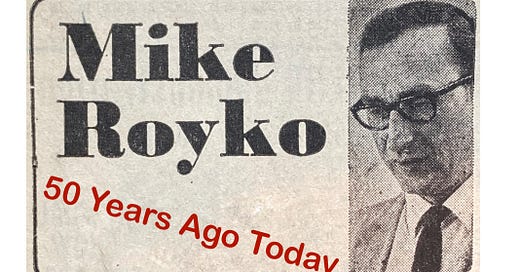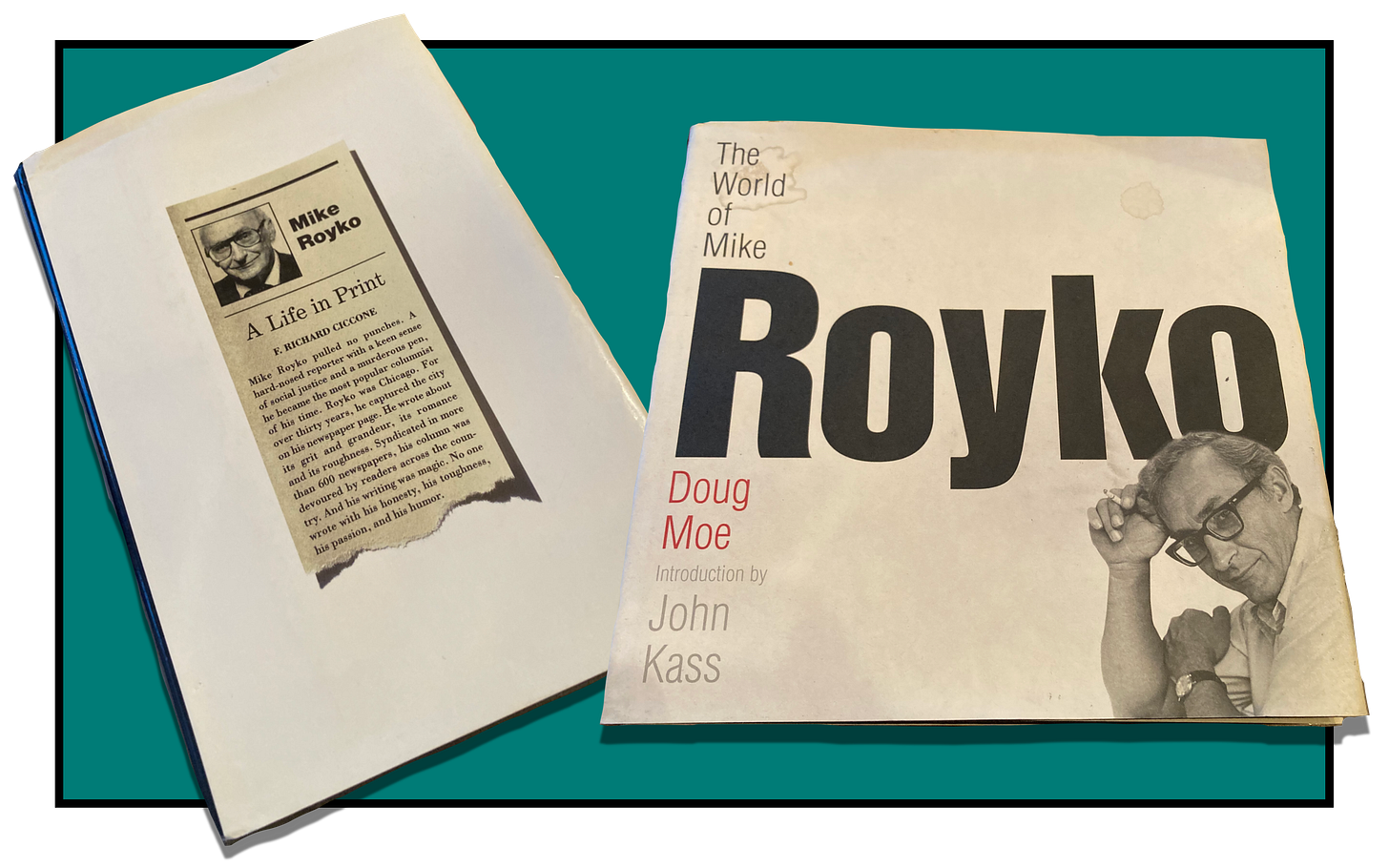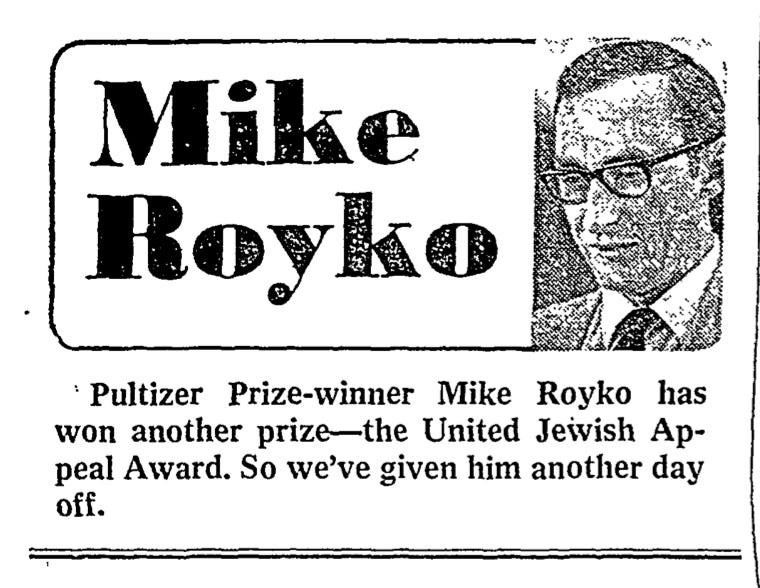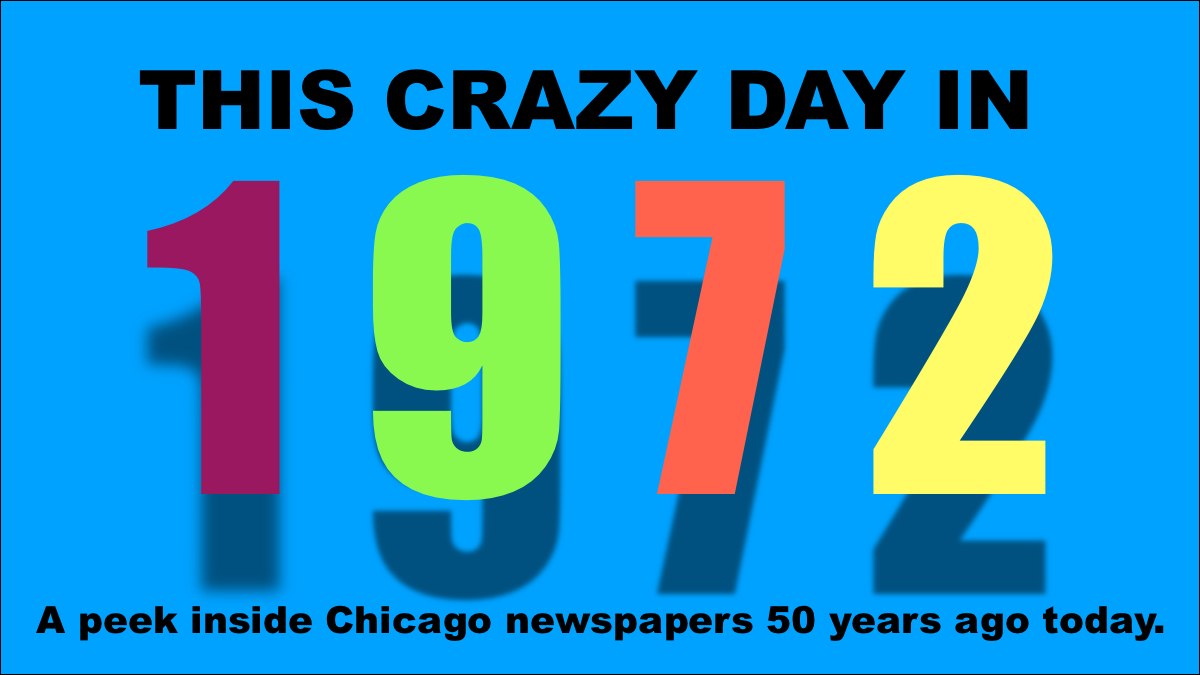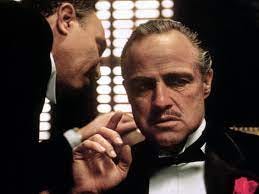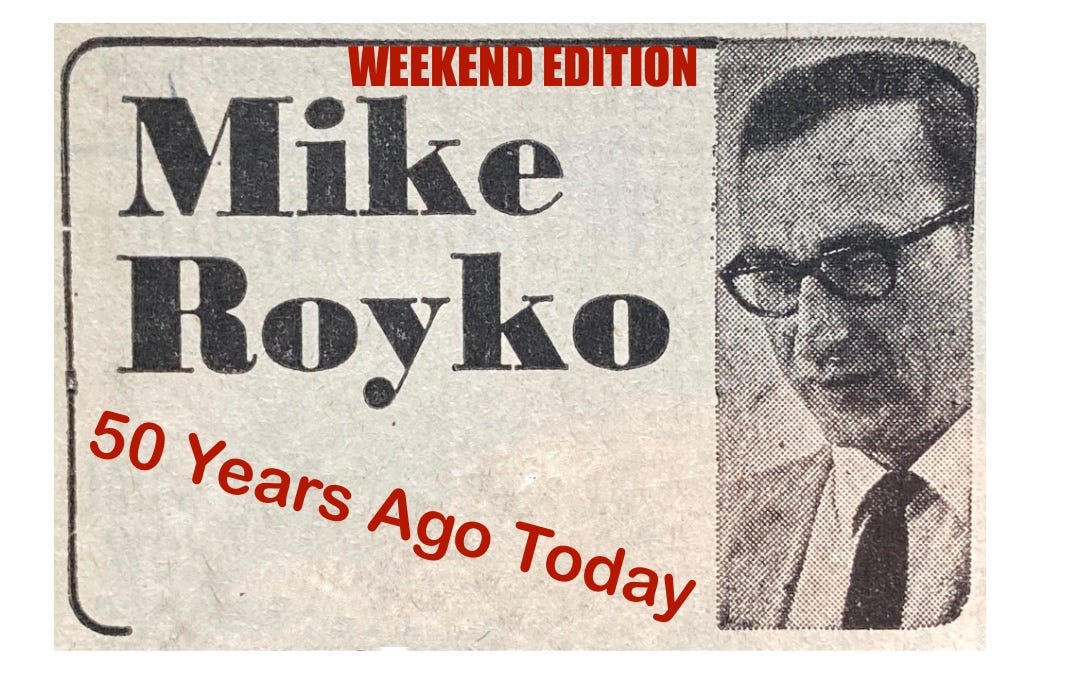Mike Royko 50 Years Ago Today: MIKE WINS THE PULITZER PRIZE!
Weekly Compilation May 1-7, 1972
To access all site contents, click on the rose icon in the upper left corner or HERE.
Why do we run this separate item, Mike Royko 50 Years Ago Today? Because Steve Bertolucci, the hero of the serialized novel central to this Substack, “Roseland, Chicago: 1972,” lived in a Daily News household. The Bertoluccis subscribed to the Daily News, and back then everybody read the paper, even kids. And if you read the Daily News, you read Mike Royko. Read the daily Royko briefing Monday-Friday on Twitter, @RoselandChi1972.
May 1, 1972
The Angela Davis trial is in full swing in California, and Davis’ sister recently came to Chicago raising funds for the legal expenses. Davis’ sister claims there’s been a plot for years by Republicans to silence Angela, led by California Gov. Ronald Reagan and President Nixon.
Mike agrees that everyone is innocent until proved guilty, but “that doesn’t mean that Angela shouldn’t stand trial,” he writes. “Maybe it was merely bad luck on her part, but she did get into a suspicious situation.”
Now Mike gives a quick recounting of the background:
“As you know, several convicts escaped from a courtroom after they somehow got their hands on guns. They took hostages, including a judge. During the shootout, they killed the judge and three of them lost their lives. The government says the convicts’ guns had earlier been purchased by Miss Davis. And since she had been publicly sympathetic to the cause of the Soledad Prison inmates, which these men were, she is accused of supplying them with weapons.”
“Of course, Miss Davis’ backers will answer that a lot of black people have been shot, hanged, and kicked to death by white racism, with little effort made to trace the guilty gun, rope or foot. And I can’t argue with that.
“But that dead judge in California hadn’t been found accused of it.”
It’s unreasonable, writes Mike, to say it’s unreasonable to hold a trial.
May 2, 1972
Mike Royko wins the third-ever Pulitzer Prize for journalism commentary! He really should have won the first one, but we’ll let that go.
Instead of a column, this is what Royko readers saw when they turned to page 3 today:
Mike was visiting his brother in Madison, Wisconsin when the news came in. According to Doug Moe’s terrific biography, "The World of Mike Royko," Mike got a message to call his secretary.
But first, he went to the bathroom.
“So I’m standing there with my schwanz in my hand,” he recalled later. Why was the paper tracking him down? “And then it came to me. ‘Oh, wait a minute, Holy Christ, I won the Pulitzer.' It was not the way I would have wanted it to be. The way to win the Pulitzer is you want to be in the office when it comes in over the wires and everybody cheers. But this is how I found out--by reading the toilet bowl.”
According to Richard Ciccone’s also terrific biography, “Mike Royo: A Life in Print,” Mike Royko was “disappointed and angry” when he didn’t win the first Pulitzer handed out for newspaper commentary in 1969, “suffering again from the old insecurities that he fretted about when he couldn’t get hired at the Daily News. He felt the Eastern establishment media wouldn’t honor him because he was a Chicago writer and didn't cover Washington.”
May 2, 1972
Chicago Daily News editorial
May 2, 1972
Chicago Daily News: Royko wins our 15th Pulitzer
By Diane Monk
“When Mike Royko wins a Pulitzer Prize, he sees it as just one more reason to keep standing up for the little guys, the guys who do so much of the work and get so little of the credit,” writes Diane Monk.
“Thousands of Chicago’s little guys have recognized Royko as their guy since Sept. 6, 1963, the day his first column appeared in The Daily News.” Nobody would expect the biggest journalism honor of all, the Pulitzer, to change Royko one bit, she writes. “It hasn’t.”
“‘Sure, I like to win,’ Royko said between congratulations at Riccardo’s Restaurant, where newspaper people go when they can afford a splurge. ‘Newspaper awards are meaningless now, and they will be as long as only the stars are recognized. An award will have meaning to me when it seeks out and recognizes the sparkle that most people never see.’
“Then Royko lists some of his newspaper stars by name…They’re the rewritemen, the copy editors and reporters who don’t get many by-lines. ‘Those are the guys who make a daily newspaper work,’ says Royko. ‘Yeah, I write a good column and I deserved a Pulitzer--but those guys deserve to win, too.’”
Note: As we mentioned earlier, Royko was at his brother’s house in Madison when the news broke, so he apparently hopped right in his car and drove back to Chicago, and Riccardo’s. Unless he stopped at the Billy Goat first.
Monk notes that Royko, then 39, had already won more prizes than could be listed in a reasonable news story. Plus, he’d sponsored Chicago’s first Mixed Breed (Mongrel) Dog Show at Soldier Field in 1967, and an Open Penny Pitching Tournament in 1971 in the Daily News-Sun-Times parking lot.
May 2, 1972
Are you wondering how the other papers covered Mike’s Pulitzer? Of course you are.
The Sun-Times put Mike in their headline, lede, and second graph of their annual Pulitzer story, but that’s all—even though as we know, the Sun-Times was owned by the same company (Field Enterprises) and shared the same squat building on the north bank of the Chicago River at Wabash, the site now occupied Trump Tower. You’d think they might throw in just one extra local paragraph to the AP story they used. Oh well—here’s the Sun-Times coverage:
What about the Tribune and Chicago Today—which is owned by the Tribune, and locked in a rather vicious circulation battle with the Daily News, like two wounded gladiators trying to see who will die first. I refer to the fact that afternoon newspapers were simply not long for this world in 1972.
Not surprisingly, the Trib and Today did not play up Mike Royko’s Pulitzer. They concentrated on a story that the Daily News didn’t really bother with—a controversy over the Pulitzer selections that year. Both papers used wire service stories, though not AP or UPI.
Chicago Today has the much zippier story—I bet they rewrote the wire copy.
“The hottest controversy in the 60-year history of the Pulitzer Prizes raged on today after the trustees of Columbia University criticized some of the journalism selections…In an extraordinary statement accompanying the list of winners…the 23-man board of Columbia trustees, who govern the presentations under the endowment of the late Joseph Pulitzer, said:
“‘Had the selections been those of the trustees alone, certain of the recipients would not have been chosen.’”
The trustees normally award the prizes according to selections from an advisory board of top editors. The trustees did that this year too, but had to bitch about it.
“The controversy was believed to center around the awards voted to The New York Times for its publication of the Pentagon papers and to syndicated columnist Jack Anderson’s disclosure of secret Washington decisions during the India-Pakistan war last December.”
After covering the controversy a bit, both the Trib and Today listed the prize winners.
Today simply listed “Commentary-Mike Royko, columnist for the Chicago Daily News”.
The Tribune was more generous: “Commentary-Mike Royko, Chicago Daily News, who was described as ‘having a flair of an old-time Chicago newspaperman in the Ben Hecht tradition.’”
May 3, 1972
Here’s what Royko readers saw when they turned to page 3 today:
Along with this:
And on page 4, Mike made the lede in Bob Herguth’s regular gossip column:
If you dig Mike Royko, you’ll want to see the news he’s writing about. Check it out here!
May 4, 1972
Mike gets back to work.
“Anybody with eyes can see that the best building on the block belongs to Sophia Flig.”
Classic Royko lede, painting a picture in our heads already of a tidy, neat apartment building and a woman who will probably turn out to be a hard-working immigrant.
Bingo.
“She and her husband, John, have that Old Country obsession about keeping their property up. Despite bad health, Mrs. Flig, 58, still scrubs the hallways and sweeps her sidewalk. Everything she and John have is contained in the building, a five-flat with a grocery on the first floor, at 2038 W. Coulter, on the Southwest Side.”
Mike has painted another portrait for us of struggling, hardworking immigrants who have run afoul of the Democratic Machine, and fallen under its unforgiving wheels.
“‘Long time ago,’ says Mrs. Flig, in a broad Polish accent, ‘lawyer tell us, as long as you are here, give the inspector $25 or $50 every year. Everything will be OK.’”
Let’s be clear: That’s actually $168.76-$337.50 in 2022 money. That’s a lot of money for working class people. The Fligs paid it anyway, every year, to stay on the Machine’s good side. But their health turned bad as they aged. Their grocery store is “practically dead,” Mike writes, because “people seldom shop in neighborhood food stores anymore.” In 1972, supermarkets are crowding out small businesses like the Fligs. So the Fligs couldn’t afford to bribe city inspectors the last few years.
“Even the city’s building inspectors used to agree that it was a good building,” writes Mike, “but the inspectors don’t care for the building anymore. Mrs. Flig says they changed their minds when she stopped handing out bribes.”
Now the Fligs are afflicted by building inspectors, who demand expensive changes for zoning rules that changed long after the building went up. They constantly traipse around looking for new violations and scaring away the tenants. “Maybe that’s why I had heart attack,” says Mrs. Flig.
The Fligs’ alderman, Vito Marzullo, won’t help. In a fit of foolish Polish pride, the Fligs put up an Adamowski sign in their store window when Benjamin Adamowski ran against Mayor Daley.
“That night their windows were caved in.”
“They have little income, beyond the Fligs’ Social Security check, and they can’t afford to maintain their building and pay the higher taxes. But if they sell it, they will get little because of the city’s demands for costly improvements,” writes Mike.
“When I lay down to sleep, I’m afraid to die because nobody will be here to take care of my husband,” says Mrs. Flig. “And I’m afraid to live on account of all my trouble.”
Mike’s conclusion:
“About the only consolation one can offer Mrs. Flig is that she is fortunate to live in the one big American city that really works.”
May 4, 1972
May 5, 1972
“Most of the time, Ald. Fred Roti says nothing. Silence is a tradition of the men who represent the 1st Ward in City Hall. Like others before him, Roti just sits there, his eyes half closed, making sure nobody gets more than he does.”
First, we’ll all laugh at the hilarious throw-away last line—”making sure nobody gets more than he does.”
Second, for Younger Readers: The 1st Ward was notorious for being run by the syndicate, the Outfit—Chicago parlance of the time for “Mafia.”
“But this week, Roti actually said something….Roti wanted to back the mayor in the current controversy over blacks and the police department, so he said:
“‘Mayor Daley told it like it is….Mayor Daley is telling the people of Chicago they have to co-operate with the police, and that when they are wrong, proper action will be taken.”
For those who aren’t reading THIS CRAZY DAY IN 1972, the big news this week is a groundswell movement by Black Chicago leaders against police brutality—led by former Machine loyalist U.S. Rep. Ralph Metcalfe. Rather than write directly about the big meetings this week led by Metcalfe and Mayor Daley on police-Black community relations, or the many political press conferences, Mike finds his own, different way to comment on the issue. Mike’s way is Ald. Fred Roti.
Now that Roti has “become one of our many law-and-order advocates,” writes Mike, “we might take a look at his credentials in this area.”
In Roti’s long career on the public payroll, a dozen other Rotis at a time plus in-laws have simultaneously held city jobs. “I don’t know why they needed the city jobs,” writes Mike, “since some of them seemed to be doing well as bookies and in other rackets.”
Roti got started in government early in 1950 as a state legislator, but he wasn’t a typical Machine flunky. “Roti held office because he was a son of a man who, while not at all famous, was highly influential.”
Bruno Roti appeared to be a humble tavern keeper around 26th and Wentworth, “a tough area known as ‘The Patch,’” writes Mike. “The only thing strange about him was that more famous men, such as Tony Accardo and Paul Ricca, would take their hats off in his presence.”
Bruno’s funeral attracted 3,000 mourners, including a marching band. “Mario Puzo could have got an entire chapter out of that funeral.”
“Considering this background, Ald. Fred Roti just doesn’t seem a likely authority on law and order and the responsibilities of citizens.”
As we here all know, weekends could be sad for a Daily News family because Mike Royko wasn’t in the Daily News’ single weekend edition. So we look for Mike elsewhere on weekends.
May 6-7, 1972
Naturally, readers had to have their say about Mike’s Pulitzer in the Daily News letters section.
By the way, this feature is no substitute for reading Mike’s full columns. He’s best appreciated in the clear, concise, unbroken original version. Mike already trimmed the verbal fat, so he doesn’t need to be summarized Reader’s Digest-style, either. Our purpose here is to give you some good quotes from the original columns, but especially to give the historic and pop culture context that Mike’s original readers brought to his work. You can’t get the inside jokes if you don’t know the references. Plus, many columns didn’t make it into the collections, so unless you dive into microfilm, there are some columns covered here you will never read elsewhere. If you don’t own any of Mike’s books, maybe start with “One More Time,” a selection covering Mike’s entire career and including a foreword by Studs Terkel and commentaries by Lois Wille.
Do you dig spending some time in 1972? If you came to MIKE ROYKO 50 YEARS AGO TODAY from social media, you may not know it’s part of the book being serialized here, one chapter per month: “Roseland, Chicago: 1972.” It’s the story of Steve Bertolucci, 10-year-old Roselander in 1972, and what becomes of him. Check it out here.
To get MIKE ROYKO 50 YEARS AGO TODAY in your mailbox weekly along with THIS CRAZY DAY IN 1972 and new chapters of the book—
SUBSCRIBE FOR FREE!

